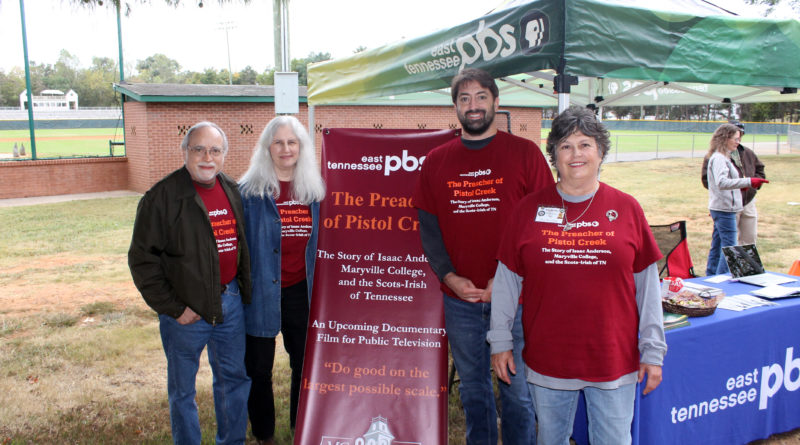“The Preacher of Pistol Creek” production team visits Maryville College.
On Saturday Oct. 19, the production team of “The Preacher of Pistol Creek,” a documentary film about Isaac Anderson and the Scots-Irish in Tennessee, was set up at a booth outside of the alumni gym to publicize the film and make connections with Maryville College students, alumni and community members.
Chris Moser, the director, producer and writer for the documentary, discussed the film’s origins and his hopes for the project’s impact and message.
“I’ve always been interested in my Scots-Irish heritage … we always grew up looking at our ancestral castle in Scotland, and we knew a lot of genealogical lore,” Moser said. “I made my first visit to Northern Ireland in 1994 and fell in love with the country and its people. I wanted to do something to encourage more Americans—particularly people who are descended from there—to go and visit … way back then, [I] starting working toward a public television project on the history of the Ulster Scots and their American relations, the Scots-Irish.”
After spending time working on other projects, working for CNN, and teaching, Moser found his way back to working on another project involving the Scots-Irish through learning about Isaac Anderson.
“The history of Isaac Anderson was brought to my attention, and I came to realize that for various reasons he would be … just the right kind of character to develop to tell the history of the Scots-Irish in Tennessee,” Moser said. “You want to develop a character that people get drawn into. You put them in some kind of conflict and out of that comes some kind of change that’s important—that’s why I love history. History is about the most fascinating characters engaged in the most dramatic conflicts that produce the most lasting changes.”
Having Isaac Anderson function as a main character, whose story coincides with the great change that the Scots-Irish brought to Tennessee, became increasingly appealing as Moser continued learning about his life and values.
“I saw that it could be a really fascinating way to tell the story of the Scots-Irish people in Tennessee by telling it through the perspective of Isaac Anderson,” Moser said. “He exemplifies how important the Presbyterian church was in bringing [to Tennessee] not just religion, obviously, but literacy and principles of democracy that have been embedded in the Presbyterian church since its founding. He’s an excellent character to debunk stereotypes about the Scots-Irish as these uncouth, illiterate hillbillies. The Ulster Scots immigrant colonists are the second most educated demographic group that came, and that’s largely because of the Presbyterian church.”
Anderson’s progressive beliefs were another part of his character that made him an appropriate vehicle to tell the story of the Scots-Irish impact on East Tennessee.
“He was also a progressive force. Besides encouraging education, he encouraged women’s equality, and he encouraged emancipation … I like to compare him—and in the film we will compare him to—St. Patrick. Patrick spread Christianity through Ireland … there’s that parallel to Anderson in East Tennessee … Patrick opposed slavery in Ireland. He was for elevating the status of women way back in the 400s A.D. Anderson brought women into the college. In a lot of ways, I think of him as the St. Patrick of the East Tennessee backwoods,” Moser said.
Several Maryville College faculty and alumni will be a part of the project as well. Associate professor of history, Dr. Aaron Astor, will serve as a consultant and scholar for the film along with class of 1970 alumni Jeff Coghill. Class of 2019 alumni Lenny Lively is the project assistant, and Melinda Shannon, class of 1980 alumni, is the project coordinator for the documentary.
“I’m so enthusiastic about writing, producing this film, and having people on board, scholars like Aaron Astor, to work with me on it,” Moser said. Support from the college and community have been integral to the formation and overall support of the project thus far.
“Last April, I approached the college through Caroline Lamar … just saying what I would like to do and just asking for the college’s blessing. The response was immediate and, so with that endorsement I then went to the tv station ETPBS and invited them to partner and make it their production. They agreed enthusiastically as well. Our presence here today marks the inauguration of what will be a fundraising campaign,” Moser said.
Moser wants the film to be shot in a “high quality manner” with filming done not only in Maryville but in neighboring states and in Ireland and Scotland.
Moser’s passion for the project is apparent, and his dedication to telling a story that captures the power of Isaac Anderson’s legacy as well as an accurate history of the Scots-Irish is inspiring. Ultimately, he made the statement many scholars and creatives make that dispel any doubts of commitment or intention; “This is a labor of love for me.”

